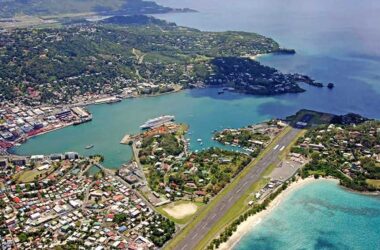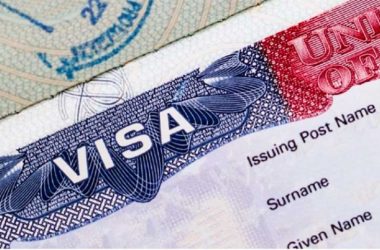
Following a series of fleeting visits and related initiatives dating back to September, St. Vincent and the Grenadines Prime Minister Dr Ralph Gonsalves announced on Saturday he had secured an agreement with the Presidents of Guyana and Venezuela to meet in Georgetown tomorrow (December 14) to discuss the ongoing controversy over Venezuela’s latest renewed claim on more-than-half of Guyana.
Dr Gonsalves, the longest-serving Head of Government in the Caribbean Community (CARICOM) and current rotating President of the Community of Latin American and Caribbean Nations (CELAC), says his initiative involved direct contacts with: Presidents Dr Irfaan Ali and Nicolas Maduro, CARICOM Chair Dominica’s Prime Minister Roosevelt Skerrit, the Foreign Affairs Ministers of Guyana and Venezuela, as well as Brazil’s President Luis Ignacio ‘Lula’ DaSilva, Cuba’s President Miguel Diaz-Canel and United Nations (UN) Secretary General Antonio Guterres.
Guyana and Venezuela are both heading to Georgetown holding tight to their respective positions and with no extra baggage – Guyana insisting there is no dispute, Venezuela insisting its century-old claim is as valid today as in 1899.
But the mere fact that Dr Gonsalves has been able to get his two presidential friends and colleagues to agree to sit and talk while the rest of the world is predicting war, is more than just a compliment, but also a significant achievement for Caribbean Diplomacy.
CARICOM and CELAC, thanks to the confidence of his colleagues in the veteran Caribbean leader, have achieved a feat thought difficult, if not impossible, a week ago.
Dr Gonsalves, the most-consecutively-reelected Prime Minister in CARICOM history and a former student leader and political science lecturer at the University of the West Indies (The UWI), is also well-placed, in his CELAC position, to continue facilitating dialogue with and between Guyana and Venezuela’s leaders aimed at uniting the two neighboring nations that both belong to CELAC and CARICOM.
The St. Vincent & The Grenadines PM is under no illusion that Thursday’s meeting will yield immediate results, him citing examples of lengthy negotiations before peace talks to end the likes of the Vietnam War, long before the leaders got to smoke the peace pipe.
The ultimate objective, he insists, is to keep the leaders talking in what CARICOM says it hopes will be a “meaningful dialogue” about a peaceful solution to the longstanding issue currently before the UN’s International Court of Justice (ICJ), which has ruled that Venezuela should do nothing to upset the way things stand, until it finally rules — whenever…
Guyana and Venezuela are both going to St. Vincent willing to talk and listen – the primary essential ingredients for any peaceful settlement.
Venezuela insists it will follow-up on its referendum results by taking steps in Essequibo that Guyana is determined to reject and resist with all its might and support.
Caracas rejects the ICJ’s rulings, but Georgetown insists Venezuela is bound by them and can be brought before the International Criminal Court (ICC) if it fails to comply.
Guyana also insists it’ll take the issue to the UN Security Council, which it’s about to join as a non-voting member, following St. Vincent’s recent term as one of the smallest Caribbean nations to hold that top UN post.
That PM Gonsalves and the various leaders and entities were able to ultimately (and somewhat surprisingly) get Guyana and Venezuela’s Presidents to agree to talk just one day before CARICOM was to meet at summit level on the issue, is another testament to the recent successes of contemporary Caribbean diplomacy.
It proves too, the Caribbean is always capable of producing positive results on matters of regional or global import — from being courted and counted-on by the rest of the world to lead in the global fight against armed gangs in Haiti, to the collective condemnation of Israel’s War on Gaza and Palestine, to qualitative mediation in the latest round of the continuing controversy over The Essequibo.
Historically, the Caribbean region has been mistakenly, unfairly and wrongly seen and treated as small-and-micro island-states whose only common denominator is their size and European colonial past, until their combined numbers at the UN and other international fora started meaning more to more countries wanting their votes and support at international gatherings.
Same with South and Central America, historically seen and treated more as appendages to the North’s economies and sources of wealth created by cheap labour, but also as sources of growing numbers of immigrants unwanted in lands built by immigrants.
That CARICOM and CELAC have been able to lead on this issue in this way is not only a long feather in Dr Gonsalves’ cap, but represents a symbolic feat for Caribbean (and Latin American) diplomacy that again underlines and reaffirms that this region is committed to remain — and maintain itself as — a Zone of Peace, in its own backyard.
Media outlets competing for ‘Breaking News’ or only interested in the ‘Now’ always scoop themselves out of seeing the bigger picture in the longer run.
But this latest episode in Venezuela’s continuing claim, coming before Presidential elections there in 2024 and in Guyana in 2025, also has its political elements involving national audiences moved by opposite appeals to patriotism.
However, the time has come for discussions on approaches involving practical solutions based on achievable objectives and recommendations that will avoid the revolving-door approach that’s so-far resulted from the UN’s Good Offices mechanism.
Guyana and Venezuela will hold fast to their respective positions while media headlines focus more on war than peace, with predictions of an inevitable clash between an immovable object and an unstoppable force, instead of appeals for applying brakes before the deadly crash that neither will survive.
This is not about Guyana and Venezuela seeking backing of shared friends, but instead, how best these two inseparable neighbors can continue to discuss, over their shared fence, how best to continue coexisting peacefully, like they’ve done for more than 125 years.














Justice for the Gobat family still waiting 3 years on and counting!